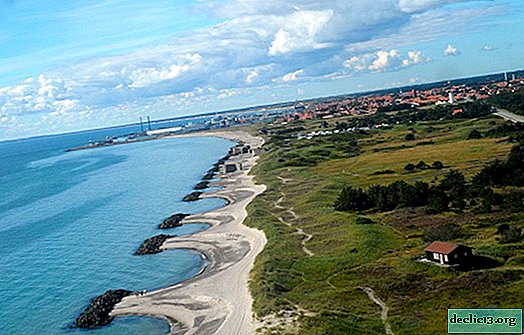How to choose a state or commercial university

In summer, the universities have a hot time - admission of applicants. For high school students - the first adult decision, the first step in a new, adult life. Most students until the last moment can not choose a university. This causes anxiety, leads to another stress (the first - passing the exam).
The choice is made more often on the advice of the parents, because they know better the abilities and preferences of the child. Sometimes parents put pressure on a child when choosing a university. Excessive persuasion and pressure will not lead to anything good, young people can make a mistake in their choice and drop out of school. Independent choice brings great responsibility for learning.
How can a student choose the right university? Many graduates determine their direction simply - they choose what they like best. If the school liked computer science, they choose programming, mathematics is easy, they choose the faculty of economics.
So, the conclusions: to choose a university, decide on a future profession. You can become a doctor, policeman, accountant, banker, economist, lawyer, linguist. Or determine the area of activity where you want to work. Depending on the chosen profession, choose options for educational institutions. Choose several universities, this will help to protect yourself from non-admission.
Levels of education and forms of training
Before talking about universities, let's pay attention to the level of higher education.
- Undergraduate. Training 4 years. A graduate receives a bachelor's degree - the base of higher education. The undergraduate program prepares qualified rank-and-file specialists for executive positions. It also ensures the development of professionalism in the necessary volume for the implementation of a number of general specialties or areas.
- Specialty. Education lasts 1 year after undergraduate studies. A diploma of higher education of a specialist with a narrow specialization with a higher qualification is issued.
- Master After undergraduate studies for another 2 years. A graduate receives a master's degree. This step involves a deeper specialization, and graduates are able to solve more complex problems of a certain field of activity, engage in research and analytical work. Master, for the most part, prepares scientific and pedagogical staff.
The form of training depends on the student’s capabilities. Universities offer forms:
- Full-time education.
- Evening - part-time.
- Correspondence.
- Remote.
- External studies.
When choosing a form of training, build on the ability to learn independently - this distinguishes these types from each other. Full-time or full-time, the student is required to attend lectures daily and listen to the teacher. An external study allows you to arrive at the university at the appointed time and report on how the independent training went, having talked with the teachers.
With the steps of education and forms of learning is understandable. Next, decide which stage suits you, and it remains to choose the right university. Educational institutions are divided into:
- state (founder of the state),
- commercial (founders private individuals, foundations, public organizations).
Which university is better for you to decide. Much depends on the financial capabilities of the family, here advice is inappropriate. Consider one more factor: diplomas of state educational institutions are valued higher than commercial ones. However, if we talk about the training of specialists, a number of non-state universities are leading the state.
How to choose a university?
Before you start choosing a university, weigh your options and consider how you passed your final exams. What is this for? To calculate whether it is possible to act on a budgetary basis or whether you will have to pay for tuition. In any university that has passed state accreditation, there is a certain number of budget (free) places. There are more such public places than commercial ones.
The next step, we define several key criteria in the choice. Primarily:
- Cost of education.
- Cost of living.
An important role is played by factors:
- Reviews of familiar students.
- The geographical location of the institution.
- Infrastructure (well-equipped library, gym, hostel)
- Highly qualified teaching staff.
- Technical equipment of the university.
- The military department.
- Prospects after graduation.
12 ways to choose a university and profession
Detailed information about universities is available on their personal sites. Do not forget to carefully study the list of documents required for admission. Some guys choose subjects in the exam. In addition to the compulsory Russian language and mathematics, a student can take several exams of his choice, for example: physics, history, social studies, geography, biology, etc. You can choose a university that will enroll in a specific specialty for good exam results for elective.
On the websites of universities there is information about the approximate for crediting the number of points. The final information about the passing score is formed on the basis of all submitted applications and the average score of those who passed the exam. This method of choice is the simplest, therefore it is better to choose the specialty where it is interesting to study and you can fully prove yourself.
Commercial Universities
There are many parameters by which a commercial university can be recommended. First of all, find out:
- Is there state accreditation, what is the material and technical condition, are there modern forms and methods of the educational process, and how well are the teachers known.
- Partnership agreements with renowned universities in the country or abroad. This indicates a high level of educational institution.
Enrollment in commercial universities takes place in different ways. Some applicants are enrolled according to the results of the Unified State Examination, the results of contests or subject Olympiads, others are enrolled after an interview, testing, or after a comprehensive assessment.
There is no competition, as such. All who have passed the selection, or who have submitted the application before the deadline are accepted. Sometimes, with an increase in the number of talented applicants, the educational institution forms additional groups, and the acceptance of applications takes place in several stages.
Tuition is paid only after enrollment. There is no charge for participation in entrance exams. Many universities allow you to pay a fee for the year fractionally, monthly payment is practiced, which is quite beneficial for the parents of the future student. Such a system is practiced mainly for girls, boys have to pay by semester or annually. So you can guarantee a reprieve from the army.
Cost of education
The cost of training depends on the region of residence. In Moscow and St. Petersburg is more expensive than in other cities of Russia. In some cases, only children of millionaires can enter a Moscow university. Another factor affecting the cost - saturation of the market with certain specialties, such as "accounting and auditing". Statistics confirm that over the past 5 years there has been a decrease in pay for this specialty.
Number of budget places
How many budget places does one university allocate? The quota for budget places is determined by the executive authorities of the subject of the federation, together with the educational institution on a competitive basis. The higher the score when passing the exam, the more likely it is to enter budget places.
State universities conduct targeted admission for students, where there is a separate competition for places. Quotas are set at the federal level after agreement with the Ministry of Education and Science. The university prepares specialists on a paid basis by concluding an agreement with a private or legal entity to pay for tuition.
The rules for admission are different, so very carefully study the rules of each university, where you are going to enter.
State Universities
State educational institutions must comply with the compulsory educational standard that exists in our country, therefore they undergo state accreditation every 5 years.
The state university has much more free places that are allocated from the municipal budget for especially talented students, taking into account the results of entrance exams. They exist for a long time, because earlier all educational institutions were state-owned, and training was free. However, it was more difficult to do due to high competition. With the advent of non-governmental educational institutions, competition has diminished. Currently, state universities have commercial branches, which reduces competition among applicants.
State educational institutions have preserved the history and traditions of teaching, provide a qualitatively classical education, but innovation is not alien to them. In a number there is a practice of internships of students abroad, a student exchange program, there is an agreement with some enterprises on the provision of jobs after graduation.

















